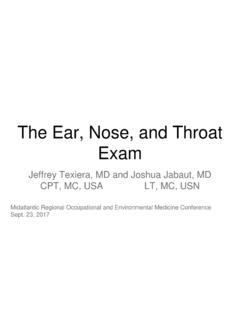Transcription of 2017-18 STUDENT HANDBOOK - Johns Hopkins Bloomberg …
1 2017 -18 STUDENT HANDBOOK @JohnsHopkinsEPI TABLE OF CONTENTS WELCOME FROM THE CHAIR DEPARTMENT MISSION AND GOALS DEPARTMENT ORGANIZATION AND DIRECTORY Administration Academic Support Core and STUDENT Funding ManagerEpidemiology Tracks and Track Directors DEGREE PROGRAMS IN EPIDEMIOLOGY DOCTORAL PROGRAMS (PhD and ScD) Welcome Letter Doctor of Philosophy and Doctor of Science Degree Programs Academic Advising Requirements Residency Track-Specific Activities Quarterly Doctoral Meetings Academic Ethics Requirement Responsible Conduct of Research Requirement Avoiding Plagiarism Course Requirement Academic Coursework Core Coursework Additional Coursework by Track: Cancer Epidemiology Cardiovascular and Clinical Epidemiology Clinical Trials and Evidence Synthesis Environmental Epidemiology Epidemiology of Aging General Epidemiology and Methodology Genetic Epidemiology Infectious Disease Epidemiology Department Comprehensive Examination Comprehensive Examination Grading Policy Teaching Assistant Curriculum Requirements Other Teaching Opportunities Thesis Advisory Committee Dissertation Research Proposal Doctoral Proposal Seminar Departmental Oral Examination Preliminary Oral Examination Primary Data Collection Requirement Doctoral Dissertation (PhD and ScD) Final Defense Seminar Final Oral Examination Flowchart and Graduation Deadlines by Degree (Doctoral)1 MASTERS PROGRAMS (MHS and ScM)
2 Welcome Letter Master of Health Science and Master of Science Programs Academic Advising Requirements Residency Track-Specific Activities Quarterly Masters Meetings Academic Ethics Requirement Responsible Conduct of Research Requirement Avoiding Plagiarism Course Requirement Academic Coursework Core Coursework Additional Coursework by Track: Cancer Epidemiology Cardiovascular and Clinical Epidemiology Clinical Trials and Evidence Synthesis Environmental Epidemiology Epidemiology of Aging General Epidemiology and Methodology Genetic Epidemiology Infectious Disease Epidemiology Department Comprehensive Examination Comprehensive Examination Grading Policy Teaching Assistant Recommendations Masters Thesis (MHS) Masters Thesis (ScM) Masters Thesis Expectations Masters Poster Session Flowchart and Graduation Deadlines by Degree (Masters) BACHELORS AND MASTERS COMBINED PROGRAM (BA/MHS) Flowchart and Graduation Deadlines (BA/MHS)
3 NON-DEGREE TRAINING Post-doctoral Fellows Certificate Programs TRACK-SPECIFIC ACTIVITIES Journal Clubs Research-in-Progress Seminars Other Track-Specific Seminars2 ACADEMIC POLICIES & PROCEDURES Academic Ethics Policy Change of Adviser Citations and References Course Waivers of Degree/Program Requirements Departmental Review of Academic Progress Schoolwide Review of Academic Progress Leave of Absence Registration Registration for Pass/Fail Option Time Status Change (Full-time to Part-time) Transfers Travel Abroad Clery Act FINANCIAL INFORMATION Master s STUDENT Financial Support Master s Tuition Scholarship Department Endowment (Continuing students ) Other Departmental Support Funds Doctoral STUDENT Financial Support NIH NRSA T32 Training Grants (Pre- and Postdoctoral Fellowships) Other Training Awards (Non-NIH) Department Named Teaching Assistantships University Named Teaching Fellowship Department Endowments (Incoming students ) Department Endowment (Continuing students ) Other Departmental Support Funds Schoolwide Funding Opportunities STUDENT Grant Application Assistance STUDENT Account Information Helpful Contact Information 3 STUDENT LIFE & PROFESSIONAL ORGANIZATIONS Diversity and Inclusion (Epidemiology Department) Epidemiology STUDENT Organization Epidemiology STUDENT Room Professional Organizations Society for Epidemiology Research (SER) American College of Epidemiology American Public Health Association Scientific Publications American Journal of Epidemiology (AJE)
4 Epidemiologic Reviews Stress Relief and Mental Health Schoolwide Resources Academic Calendar Career Services Course Catalog CoursePlus Disability Support Services Faculty Directory Financial Aid Hopkins Medical Book Center STUDENT Information System (SIS) Records & Registration SOURCE ( STUDENT Outreach Resource Center) STUDENT Account & Business Services STUDENT Assistance Program (SAP) STUDENT Assembly Libraries STUDENT Health Insurance Diversity and Inclusion Additional Resources Title IX ADVISER / ADVISEE MANUAL4 WELCOME FROM THE CHAIR Department of Epidemiology, Office of the Chair July/August 2017 Welcome to the Department of Epidemiology. As you no doubt will have repeatedly heard since you arrived in Baltimore, you have now joined the oldest and largest department of epidemiology in the world.
5 We are very proud of our past accomplishments, our history, and the accomplishments of our talented students , faculty and alumni. We are even more excited about many of the new projects that are underway or under consideration. The 2017 -2018 edition of our Department of Epidemiology STUDENT HANDBOOK introduces you to the Department and helps you to meet your educational goals and to have a productive and enjoyable year. As new students , you will be in residence for the Centennial of the Department (one of the founding departments of the School in 2019), so perhaps we can refer to you as the Centennial Cohort! This STUDENT HANDBOOK complements the JHSPH Guidebook distributed by the School each year and it should be read along with the Guidebook and the School Catalog (which can be found in its complete form on-line on the School s website) to gain a full picture of the Department and the School.
6 The STUDENT HANDBOOK summarizes the required and recommended courses for each of the eight academic tracks in the Department, the requirements for each of the degree programs offered by our Department, and other essential information you may need. Because the STUDENT HANDBOOK is revised annually, please be sure to use this 2017 -2018 edition of the HANDBOOK in planning and following your academic program in the Department; these are the rules that you should follow. students should also carefully read the listing of Competencies for students on the intranet site. We have structured our educational programs around these competencies. Our curricula are developed with these competencies as guiding principles and the Department Written Comprehensive Examination that you will sit for at the conclusion of your first year of study is directed at testing the skills and knowledge described in these competencies.
7 In addition, the Adviser/Advisee Manual in the HANDBOOK is intended to facilitate this key point of interaction between students and faculty members. Epidemiologic Methods 751-753, a core requirement for all master s and doctoral students in the Department, is our flagship series that we continue to evolve to reflect contemporary methods and challenges in epidemiologic research. Before you complete your degree, we strongly encourage you also to take the Professional Epidemiology Methods courses, which cover methods for modern public health practice. The past decade has been an era of remarkable growth in terms of faculty recruitment, admitted students and external funding of our research. The faculty of the Department remain very excited about the future of Epidemiology here at the Bloomberg School of Public Health, and we hope that you will join in our enthusiasm for the new challenges that lie ahead.
8 As I complete my ninth year as Chair of the Department, I look forward to working with you to continually evaluate and improve our curriculum to prepare you for the new world out there! I hope that your time in the Department will be enjoyable and rewarding, both educationally and personally. The faculty and staff of the Department are here to help you meet your educational and professional goals. I look forward to meeting, talking and getting to know each of you over the course of this academic year. Welcome! David D. Celentano, ScD, MHS 5 DEPARTMENT MISSION AND GOALS MISSION OF THE DEPARTMENT The mission of the Department of Epidemiology is to improve the public s health by training epidemiologists and by advancing knowledge concerning the causes and prevention of disease and the promotion of health. As the oldest autonomous academic department of epidemiology in the world, the Department of Epidemiology at the Johns Hopkins Bloomberg School of Public Health has maintained leadership in fulfilling this mission.
9 GOALS OF THE DEPARTMENT Provide the highest quality education in epidemiology and thus prepare the next generation of epidemiologists Advance the science of epidemiology by developing new methods and applications Use epidemiologic methods to investigate the etiology of disease in human populations Use epidemiologic methods to evaluate health care delivery Develop methodology for translating epidemiologic research findings into clinical medicine Develop approaches for applying the findings of epidemiologic research in the formulation of public policy and to participate in formulating and evaluating the effects of such policy The Department of Epidemiology is the oldest, and among the largest, in the world. students gain proficiency in study designs, measurement and inference to illuminate the distribution and determinants of health states as they identify and evaluate strategies for the prevention and control of disease in human populations.
10 Faculty continue to honor the legacy of excellence set forth in the early days of the department's founding bolstering our growth, development and numerous contributions to the field. A history of the Department as well as a complete list of affiliated Centers may be found on the Department s website. 6 DEPARTMENT ORGANIZATION AND DIRECTORY The Department is organized into two operations units Administration ( Epi Admin ) and the Academic Support Core and eight academic tracks. ADMINISTRATION ( EPI ADMIN ) Administration is responsible for setting the academic and research vision for the department, policy-making, financial management, research administration, human resources and payroll, and degree program leadership. *All rooms are located in the 615 N. Wolfe Street Building unless otherwise noted David Celentano Charles Armstrong Chair W6041 (410) 955-3286 Shruti Mehta Deputy Chair W6537 (443) 287-3837 Elizabeth Platz Deputy Chair W6132 (410) 614-9674 Lyn San Juan Sr.



















